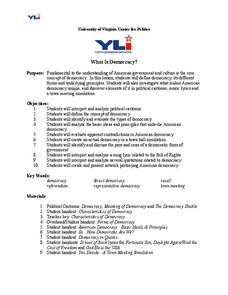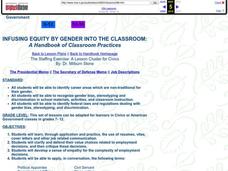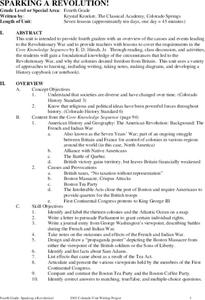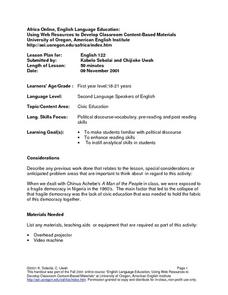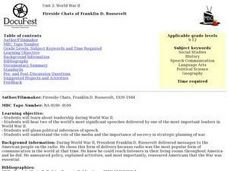Curated OER
What is Democracy?
Students examine civic duties. In this citizenship lesson, students play an online game that requires them to consider the needs of their community. Students campaign for the issue they choose in the game.
Curated OER
Infusing Equity by Gender into the classroom
Young scholars examine equality. In this civics lesson, students appoint committees for various offices then model a mock committee/application process in the classroom, followed by a discussion of whether equity was achieved or not and...
Curated OER
The Story of How Deerfield Came to Be
Eleventh graders explore how the native peoples had lived in the Connecticut Valley for nearly 10,000 years, prior to the English settlement and how their culture and life ways were markedly different from that of the English settlers.
Curated OER
Wole Soyinka
In this Cloze reading worksheet, students read the text about Wole Soyinka and complete the missing text by finding the correct words for the 15 gaps, selecting from multiple choice suggestions. This worksheet is online and interactive.
Curated OER
Conflict and Compromise
Students examine opinions about the Boston Tea Party. In this colonial America lesson, students analyze several primary sources about the Tea Party and then write essays that reveal efforts to compromise as well as efforts to instigate...
Curated OER
The Abolitionist Movement: A Fight for Freedom
Sixth graders investigate the Civil War by identifying famous figures of the era. In this slavery abolitionist activity, 6th graders read a text on the history of the Civil War and discuss heroes of the era such as Harriet Tubman and...
Curated OER
Mexico Map
In this blank outline map worksheet, students study the political boundaries of the North American country of Mexico. This map may be used in a variety of classroom activities.
Curated OER
NATO in Afghanistan – European and Canadian Positions
Learners take a closer look at Canada's committment to NATO in Afghanistan. In this global issues activity, students read a handout about NATO's involvement the Afghanistan conflict. Learners respond to discussion questions and conduct...
National Endowment for the Humanities
Lesson 2: The Debate in Congress on the Sedition Act
Pupils research and discuss the provisions in the Constitution that supported the arguments for and against the Sedition Act. They articulate objections to and arguments in favor of the Sedition Act.
Curated OER
Sparking a Revolution!
Students investigate the causes and events that lead to the US Revolutionary War. They use a number of study techniques in this unit to discuss why the colonies wanted freedom from Britain.
Curated OER
The Shot Heard Around the World
Fifth graders examine the events leading up to the beginning of the Revolutionary War. In groups, they put the events into chronological order and create a timeline. As a class, they discuss the reprecussions of the Stamp Act,...
Curated OER
English Settlement
Students study the development of the New England colonies, their rationale for settlement, and the importance of Puritan theology in this development. They research towns in England and their copies in Massachusetts.
Curated OER
The People of Kansas: Where Did They Come From and Why Did They Come?
Pupils research and discuss the reasons why early settlers emigrated to Kansas. They, in groups, analyze census district reports from the 1850's and then identify the advantages and disadvantages of using this information as research.
Curated OER
The Plains Indians
Young scholars have a better understanding of another culture other than their own. This help them to see that there were other people living in this region before us.
Curated OER
Paul Robeson: The Renaissance Man
Students research the life of athlete, actor, singer, cultural scholar, author, and political activist, Paul Robeson. They answer the question, "Which was most important to American culture -Robeson's work as a scholar, a performer, an...
Curated OER
Rules, Resistance and Repeal: How the Stamp Act Was Repealed
Eighth graders examine the causes of the American Revolution. Participating in activities, they discover how it would have felt to be taxed without representation. They identify an object from a museum and discuss how it might have been...
Curated OER
Rollin' On The River II
Students explore the importance of the Platte River to the state of Nebraska. They investigate the river's historical, social, economic, and political importance to the development of Nebraska. Students explore the ecosystem of the river.
Curated OER
Civic Education
Students in an adult ESL class are introduced to the political discourse in the United States government. As a class, they develop their own definitions of democracy. In groups, they read an article and present their analysis of the...
Curated OER
Fireside Chats of Franklin D. Roosevelt
Students view a film about Franklin D. Roosevelt and his fireside chats. THey identify political inferences in his speeches and how the media played an important role in the war. They answer questions to complete the lesson.
Curated OER
Power Play
Students explore their own attitudes and practices regarding energy use, and then examine the perspectives of others in order to develop their knowledge of the current political debate on energy policy. Students reflect on their own...
Curated OER
Mixing Races in New Orleans
Students discuss the changes in the legal, social, and political status of African Americans and those of mixed ethnicity after reading the narrative, Haitian Immigration: Eighteenth and Nineteenth Centuries.
Curated OER
Immigrants Welcome?
Ninth graders examine the world after the end of World War II. In groups, they complete a Naturalization Review Board activity and discuss how immigrants changed the United States. As a class, they discover how the immigration policies...
Curated OER
How Do You Get To Korea?
Students examine the differences between Korea and the United States. In groups, they identify the physical and political characteristics of Asia and discuss how the geographic features in Korea affect the activities performed there. ...
Curated OER
The State vs. The Individual
Students explain the roles of the Fifth and Fourteenth Amendments in regards to due process and eminent domain. They apply their knowledge of the takings issue by creating a political cartoon depicting a takings event.


